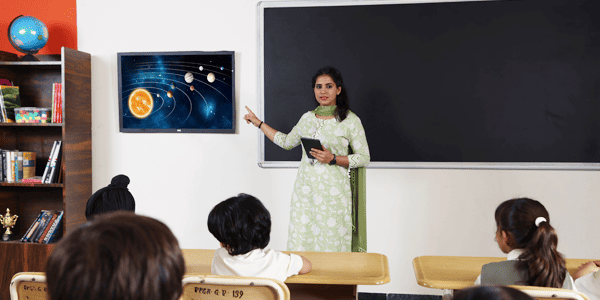Get Top Results with Primary Science Tuition Singapore from Experienced Tutors
Get Top Results with Primary Science Tuition Singapore from Experienced Tutors
Blog Article
Discovering the Various Training Approaches in Key Science Education And Learning Today
The landscape of main scientific research education and learning is evolving, with numerous mentor approaches getting prestige in contemporary class. Inquiry-based understanding, hands-on experiments, and the assimilation of technology are redefining how teachers involve young minds. Additionally, collaborative approaches and differentiated instruction are being employed to deal with the varied needs of students, enhancing both interaction and understanding. As we check out these approaches, concerns occur regarding their performance and the ramifications for future instructional practices. What might these shifts in approach mean for the future generation of students?
Inquiry-Based Discovering
Inquiry-Based Learning (IBL) is a pedagogical method that encourages pupils to explore scientific ideas via wondering about, examination, and hands-on testing. This technique emphasizes the function of students as active individuals in their understanding, advertising important reasoning and analytical abilities. By involving with real-world concerns, pupils end up being interested and determined, which boosts their understanding of clinical principles.
In IBL, teachers act as facilitators, leading pupils as they browse their questions instead of delivering info straight. This student-centered strategy enables differentiation, accommodating various learning styles and rates. Students develop skills in developing theories, designing experiments, and evaluating data, which are crucial for clinical proficiency.
Additionally, IBL promotes cooperation among trainees, motivating them to share searchings for and concepts. This collective inquiry advertises social skills and a sense of neighborhood within the classroom. Moreover, the procedure of inquiry encourages resilience, as students discover to welcome failing as a tipping stone toward understanding.
Hands-On Experiments
Hands-on experiments are an important part of efficient scientific research education and learning, complementing the concepts of inquiry-based discovering. These experiments permit trainees to engage directly with clinical principles, fostering a much deeper understanding through experiential knowing. By manipulating products and observing results, young students can grasp abstract theories in tangible means.
Such activities advertise critical reasoning and analytic abilities, as pupils assume outcomes, conduct experiments, and evaluate outcomes. This process motivates them to ask concerns, improve their understanding, and create a clinical mindset. Hands-on experiments can be tailored to varied learning styles, making certain that all students have the opportunity to engage meaningfully with the content.
In addition, hands-on experiments frequently encourage collaboration amongst peers, promoting team effort and interaction skills. Operating in teams allows students to share concepts, talk about searchings for, and discover from each other, which improves their overall educational experience.
Incorporating hands-on experiments into the key science curriculum not just enriches the learning atmosphere but also grows a long-lasting interest in scientific research. By actively getting involved in their education and learning, trainees are more probable to develop a passion for clinical inquiry that prolongs past the class.

Innovation Assimilation
Incorporating technology into main science education and learning has actually become progressively crucial in promoting pupil engagement and boosting learning end results. Using electronic tools, such as interactive simulations, virtual labs, and educational software, provides students with chances to discover clinical ideas in ingenious ways. These resources promote a deeper understanding of complicated topics by enabling students to picture and manipulate variables that would be unwise in a traditional class setup.
Additionally, innovation assimilation encourages individualized learning experiences. Students can advance at their own rate, revisiting tough concepts through multimedia resources, which provide to various discovering styles. This adaptability not just sustains private growth but additionally grows a feeling of autonomy in learners.
Furthermore, innovation works as a bridge to real-world scientific research, attaching pupils with current research and professional contributions. Accessibility to on-line databases and clinical journals widens trainees' point of views on clinical query and fosters critical assuming skills.
Collaborative Knowing
Collective knowing plays an important role in key scientific research education and learning by fostering synergy and interaction skills among pupils. This method motivates students to collaborate, share knowledge, and take part in analytic, which improves their understanding of scientific ideas. By taking part in group tasks, students discover to articulate their concepts, listen to diverse perspectives, and work out services, all of which are necessary abilities in both real-world and academic contexts.

Study shows that collective knowing can result in raised inspiration and interaction in scientific research topics, as pupils locate satisfaction in common experiences (primary science tuition Singapore). Additionally, this method prepares pupils for future collective undertakings, equipping them with the skills required for reliable synergy in higher education and specialist atmospheres. Ultimately, accepting collective knowing in primary scientific research education and learning can considerably improve the discovering experience and advertise a deeper understanding click this site of scientific questions
Separated Direction

Separated guideline can show up in numerous means, such as varying the material, procedures, or products of learning. As an example, instructors may make use of tiered projects that provide differing degrees of complexity, permitting pupils to operate at their corresponding readiness levels. In addition, versatile organizing approaches can help with cooperation among students with different capabilities, fostering peer understanding.
Evaluation plays an important role in this approach, as it educates direction and assists instructors recognize each student's special demands. Formative evaluations, such as quizzes and observations, can direct teachers in readjusting their techniques to enhance learning end results. primary science tuition Singapore. Eventually, by carrying out set apart guideline in key science education, teachers can cultivate a much more efficient and fair knowing environment, empowering all pupils to reach their complete capacity in comprehending scientific sensations
Final Thought
In summary, the diverse training techniques in main science education, consisting of inquiry-based discovering, hands-on experiments, innovation combination, collaborative learning, and differentiated guideline, jointly add to a more effective learning atmosphere. These approaches advertise important thinking, problem-solving abilities, and a much deeper comprehension of scientific principles. By implementing these techniques, educators can develop helpful and interesting classrooms that resolve the different needs of trainees, ultimately cultivating a lifelong passion in scientific research and enhancing scholastic success.
Inquiry-Based Discovering (IBL) is a pedagogical strategy that urges pupils to why not look here explore scientific principles via wondering about, examination, and hands-on trial and error.Collaborative learning plays a vital duty in key scientific research education by fostering teamwork and interaction abilities amongst pupils.Study shows that collaborative discovering can lead to enhanced motivation and engagement in scientific research subjects, as pupils locate pleasure in common experiences.In promoting an inclusive understanding atmosphere, distinguished instruction arises as a vital method to accommodate the diverse needs and abilities of trainees in main scientific research education and learning. Inevitably, by applying differentiated instruction in main science education and learning, instructors can grow an extra effective and equitable learning environment, empowering all students to reach their full potential in comprehending clinical sensations.
Report this page